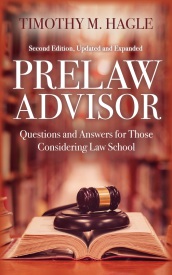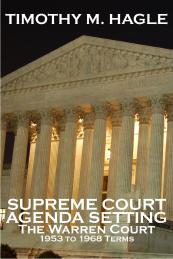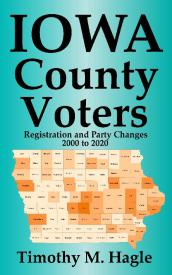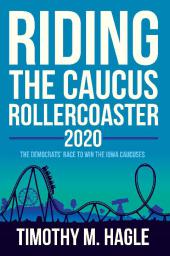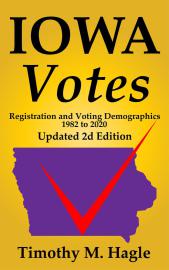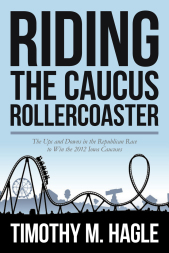
Contact Info
347 Schaeffer Hall
319-335-2348
timothy-hagle@uiowa.edu
Twitter: @ProfHagle
Fall 2024 Office Hours
Tue & Th: 4:45-6:15
Mailing Address
Dept of Political Science
341 Schaeffer Hall
20 E. Washington Street
The University of Iowa
Iowa City, Iowa 52242
News
Posted updated Prelaw FAQ for UI students
New Book, Riding the Caucus Rollercoaster 2024, published in paperback and for Kindle devices.
Posted updates to 12 papers in Iowa Voting Series for 2022 election data
New Book, Supreme Court Agenda Setting: The Warren Court, published for Kindle devices and computers with Kindle reader.
Published updated and expanded edition of Prelaw Advisor in paperback and for Kindle readers
My books
POLI 3113 Research in Judicial Politics
Note: Spring 2023 was the last time I taught this course. The data gathering part of the database project on which this course was based has concluded.
Books and materials: Spring 2023, a coursepack and other materials will be available on ICON, though some copies will need to be made for a cost of about $30 total, copies will need to be made from the law library for a cost of another $25 or so; students should have a law dictionary from prior course(s).
The essence of this course is to teach students how research is done in political science, and, more specifically, in the study of judicial politics. The best way to learn the basics of research is to actually participate in an ongoing research project and this course gives students the opportunity to do just that.
As I likely mentioned in one of my other classes (30:116, 30:153, or 30:158), I am working on a major research project. The basic goal of the project is to gather information on every case put on the Supreme Court's appellate docket from 1946 to the present. Currently this information is only available by consulting several different sources. I plan to construct a database that gathers all this information in one place. In addition, my United States Supreme Court Docket Database will be structured so that it can be linked to the other major judicial database.
As you might imagine, construction of such a large and comprehensive database will involve a lot of work. Thus, I need a great deal of research assistance in gathering data from the various sources, entering the data into the database program, and in validating the data entered. Students interested in working on this project as part of 30:106 (or an independent study project) will give me some of the necessary research assistance. The project is so large that it is unlikely that I would be able to receive anywhere near the funding necessary to hire a sufficient number of research assistants. By offering you the opportunity to do this research as part of a research course, I will be able to do the project, and at a greatly reduced cost to the University (or other entity if I am able to obtain additional funding). An additional benefit to me is that I have researchers who are interested in learning something about legal and judicial research (and who, given that those eligible for the course must have had me for 30:116, 30:153, or 30:158, already have a basic understanding of the judicial process).
The research consists of three basic activities: data gathering, data entry, and data validation. Based on my experience with other students who have worked on this project, I will assign each student a set of cases and a certain number of them must be completed each week. Students working on the project for the first time will primarily be involved learning how to do research in the law library to do the data gathering and data entry for these cases. Some students, particularly those with prior experience on the project will likely be involved in data validation. This will give everyone maximum exposure to as many aspects of the project as possible. For data gathering, you will become familiar with the law library and several sources of case information. For data entry, you will use the Political Science ITC (21 SH) and will learn the database program Microsoft Access. For data validation, you will learn how to cross-check the data and resolve inconsistencies and problems. This may not sound like much in three short sentences, but the combination of the three stages will give anyone planning on law or graduate school an opportunity to get some hands-on experience in doing legal and judicial research. Because I do not expect you to know that much about the judicial system (just what you learned in my courses!), you will also have the opportunity to learn much more about the process—mostly at the Supreme Court level, but a fair amount about other courts as well. At the data gathering stage you will be reading cases and short case summaries, so you will also be able to learn a bit about different areas of the law. At a more general level, you will also have access to me—someone you might want to have write you a letter of recommendation. If I get to know you and your work habits and abilities, I can write you a much better letter of recommendation.
Course Requirements
The biggest requirement is probably a willingness to learn about and work on the project. I can teach you what you need to know, but if you are not interested in learning and working it will not be very a very valuable experience for either of us. Although I expect you to know the material from my course(s), I will show you how to use the necessary materials in the law library. (A definite plus if you are planning on law school.) For the computer work you will be using a PC running a Windows program. If you are familiar with Windows, or a database program, it will probably help, but if not, it shouldn't require more than a few hours of instruction to show you the basics of how to use the program and enter data. (Computer skills are always a plus in the job market.)
During the regular school year, you should plan on about 10-12 hours of work per week for a 3-credit course. This is flexible. You may want to put more time in at the beginning of the semester so you have more time for your other courses at the end of the semester.
Grades will be based on how quickly you master the material and the quality of your work on your assigned set of cases. I am not planning on being strict about this. You should be doing this because you want to learn something about the project, not because you need a good grade.
There will be no tests, papers, or assignments other than learning and doing the work.
There will be no textbooks. I will, however, ask you to purchase four things for the work: a small course pack (which is actually broken up into two parts), a copy card for the law school copy machines, a roll of Scotch Magic tape, and a pair of scissors. As part of the work you will need to make copies of case summaries and tape them to codesheets. One $20 copy card will probably be more than enough for the semester. The course pack will include training materials and explanations of parts of the Docket Database.
I regularly communicate with the class and individual students via e-mail, so all students will need a working e-mail account. More information on this can be found on my electronic resources information page. (That information is getting a bit out of date, but having an email account is not likely to be a problem these days.)
There will be a regular weekly class meeting in a regular classroom, but the first week we will meet in the Political Science ITC. For the first several weeks class time will be used to teach you to use the computers in the Political Science ITC, the software we will be using, and the sources in the law library. These training sessions will last about two hours. After that the weekly class meetings will be used to give progress reports and discuss the work. From past experience I can tell you that I usually give mini-lectures on various topics in judicial process during the weekly meetings.
For any of you who are Political Science majors and are interested in our Bachelor of Science degree program, this course can substitute for the research tutorial (30:193). Similarly, this course, with a bit more work, qualifies to substitute for the Honors Research Project (30:185). See me for more details.
If you have any questions about this project or the course, please do not hesitate to ask.
